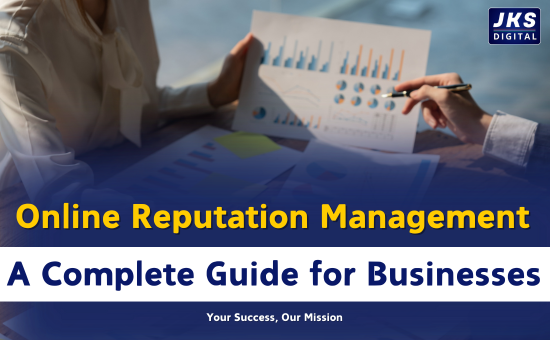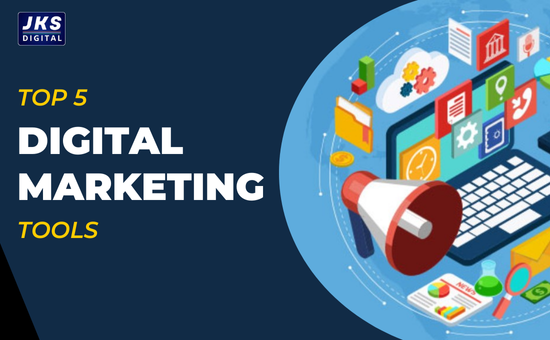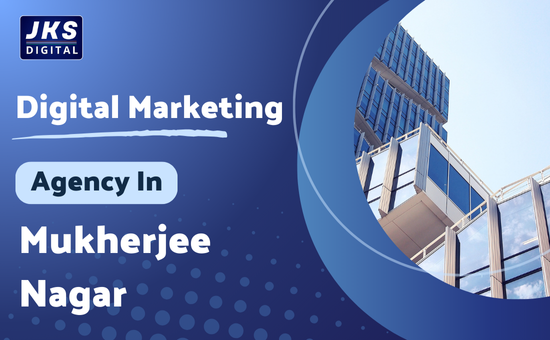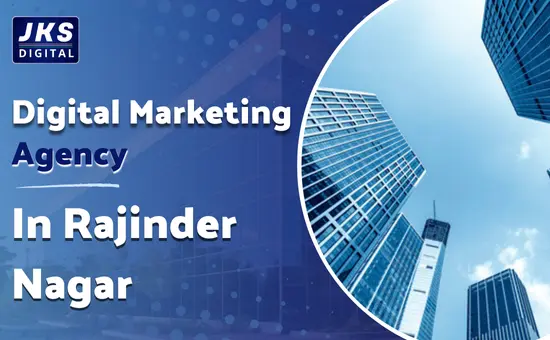Online Reputation Management: In today’s digital age, online reputation can make or break a business. With customer reviews, social media posts, and industry forums readily accessible, people form opinions quickly. Effective online reputation management (ORM) helps businesses maintain a positive image, build trust, and ultimately drive more success.

For JKS Digital, a leading digital marketing agency in Delhi, ORM is a crucial service we offer to help clients create a solid brand image online. This guide covers everything you need to know about online reputation management, including its benefits, challenges, and best practices.
Table of Contents
- What is Online Reputation Management (ORM)?
- Why Online Reputation Matters
- Key Strategies for Effective Online Reputation Management
- Common Challenges in ORM and How to Overcome Them
- Benefits of a Strong Online Reputation
- Conclusion
1. What is Online Reputation Management (ORM)?
Online Reputation Management (ORM) involves monitoring, influencing, and controlling how a business or individual is perceived online. It encompasses a variety of activities, from responding to reviews and managing social media to optimizing search engine results and engaging in public relations.
ORM goes beyond simply responding to negative feedback—it’s about proactively shaping public perception, addressing customer concerns, and building brand loyalty. JKS Digital, as a digital marketing agency in Delhi, understands the significance of ORM in today’s digital landscape, where a single negative review can impact a brand’s reputation.
2. Why Online Reputation Matters
In a world where information is readily accessible, a brand’s reputation significantly impacts its credibility, customer trust, and revenue. Here’s why maintaining a positive online reputation is essential:
Read more – What is Drop Servicing Business, How to Start It with 0 Investment: A Complete Guide
2.1 Building Customer Trust and Credibility
Consumers are more likely to trust a brand with positive reviews and an active, respectful online presence. A strong reputation establishes credibility and helps potential customers feel confident about their purchase decisions.
2.2 Influencing Purchase Decisions
Most consumers read online reviews before purchasing a product or service. Positive reviews and ratings can directly influence buying decisions, while negative reviews may deter potential customers.
2.3 Competitive Advantage
Brands with a well-managed online reputation are more likely to stand out from competitors. A positive reputation not only attracts customers but also positions the brand as a trustworthy and reliable choice.
2.4 Enhanced Brand Image
ORM helps to shape public perception and strengthen the brand’s image over time. Brands with a strong online presence and positive feedback are often perceived as more professional and credible.
2.5 Long-Term Business Growth
A well-maintained online reputation leads to better customer retention, increased sales, and long-term business growth. Satisfied customers are more likely to return, recommend the brand to others, and become loyal advocates.
Read more – Introduction to (SEO) Search Engine Optimization 2025: Complete Guide
3. Key Strategies for Effective Online Reputation Management
3.1 Monitor Online Mentions
Monitoring tools like Google Alerts, Mention, and Brand watch can help track brand mentions across the internet. Knowing what’s being said about your brand allows you to address concerns promptly and manage any negative feedback.
3.2 Engage with Customer Reviews
Responding to reviews shows customers that you value their feedback, whether positive or negative. Thank customers for positive reviews and address negative feedback professionally, aiming to resolve issues and improve satisfaction.
3.3 Build a Strong Social Media Presence
Social media is one of the most visible aspects of a brand’s online presence. Regularly post valuable content, engage with followers, and respond to comments and messages. A responsive, active social media presence reflects positively on your brand.
3.4 Optimize Search Engine Results
Search engine optimization (SEO) can help you control what people see when they search for your brand online. By optimizing positive content and leveraging keywords such as “Digital Marketing Agency in Delhi,” you can increase the visibility of positive information and drive down negative results.
3.5 Create High-Quality Content
Publishing high-quality, informative content helps establish your brand as an authority in your industry. Articles, blog posts, and social media updates allow you to share your expertise and build trust with your audience.
3.6 Encourage Positive Reviews
Satisfied customers may not leave reviews unless encouraged. Politely ask happy customers to share their experiences online. A higher volume of positive reviews can offset any negative feedback and improve your brand’s overall rating.
Read more – Most Popular Strategies to Increase Blog Views
3.7 Collaborate with Influencers
Influencer partnerships can help build your brand’s credibility and reach a wider audience. Collaborate with influencers who align with your brand values, as their endorsement can enhance your reputation among their followers.
3.8 Be Transparent and Authentic
Honesty and transparency go a long way in reputation management. If mistakes happen, own up to them and communicate openly with your audience. Authenticity builds trust and fosters stronger customer relationships.
4. Common Challenges in ORM and How to Overcome Them
ORM is not without challenges. Here’s a look at some common issues businesses face and solutions to overcome them:
4.1 Managing Negative Reviews
Negative reviews are inevitable, but how you handle them makes a difference. Respond to negative feedback professionally, apologize if necessary, and offer solutions to resolve the issue. This shows potential customers that you value feedback and are committed to customer satisfaction.
4.2 Controlling Fake Reviews
Fake reviews can be damaging, especially if they’re negative. Many review platforms have mechanisms to report fraudulent reviews. Regular monitoring and addressing suspicious reviews can help manage this challenge effectively.
4.3 Handling Social Media Crises
Social media crises, like viral negative comments or backlash, can harm a brand’s reputation. Have a crisis management plan in place, respond quickly, and address concerns professionally to prevent further escalation.
Read more – Digital Marketing Strategies for Education Businesses: Your Guide to Success
4.4 Staying Consistent Across Channels
Consistency is key in ORM. Inconsistent messaging or engagement can confuse customers. Maintain a consistent brand voice, respond promptly, and ensure all team members are aligned with your ORM strategy.
4.5 Privacy and Compliance Issues
In handling customer data, compliance with privacy laws (such as GDPR) is essential. Mishandling data or not securing it can lead to reputational damage. Be transparent about data use, and invest in secure data management practices to prevent breaches.
5. Benefits of a Strong Online Reputation
Having a robust online reputation brings numerous advantages, helping businesses thrive in a competitive digital space. Here are some of the key benefits:
5.1 Increased Customer Loyalty
A positive reputation fosters customer loyalty. When customers feel valued and have positive interactions with your brand, they are more likely to return and recommend your business.
5.2 Enhanced Brand Credibility
A well-managed reputation enhances brand credibility. Customers are more likely to trust a business with a strong, positive online presence, leading to higher conversion rates.
5.3 Improved Search Engine Rankings
Positive online mentions and content can boost search engine rankings, making it easier for potential customers to find your business. Effective SEO and ORM go hand in hand, enhancing visibility and attracting more traffic.
5.4 Higher Profit Margins
When customers trust your brand, they are more willing to pay for your products or services. A positive reputation justifies pricing and enables businesses to maintain higher profit margins.
5.5 Greater Influence in the Industry
A strong reputation gives businesses greater influence, allowing them to attract high-quality clients, partners, and collaborators. It positions the brand as a thought leader and trusted entity in the industry.
Read more – Traditional Marketing vs. Digital Marketing: Choosing the Right Strategy for Your Business
6. Conclusion
In today’s digital-first world, managing your online reputation is crucial to business success. For JKS Digital, a digital marketing agency in Delhi, ORM is a key service that helps businesses protect and enhance their brand image. From monitoring reviews to engaging on social media, ORM encompasses a range of activities designed to build trust, loyalty, and credibility.
With proactive strategies, a well-defined ORM plan, and a focus on transparency, businesses can effectively manage their online reputation, turning customer trust into long-term growth. A strong reputation not only enhances your brand image but also empowers you to stand out in a competitive market and foster a lasting connection with your audience.






